The proposal to reduce incentives for electrical energy sources, made by the Federal Government through the Provisional Measure 998/2020, must start with fossil and non-renewable sources, in order to stimulate clean electricity generation in Brazil.
This statement was made by lawyer Bárbara Rubim, CEO of Bright Strategies, specialized in regulation and business models for the Brazilian photovoltaic segment. For the executive, the change in incentives needs to be transversal and applied to all sources included in the CDE (Energy Development Account), the cost of which is shared by all Brazilian consumers.
“In addition to starting with the most polluting generation sources, the measure must respect the principle of isonomy and be applied to all matrices that access the CDE, including natural gas, mineral coal and diesel”, highlighted Bárbara.
According to her, the change in incentives for energy generation sources must consider the environmental, social, economic and electrical attributes of clean sources, especially solar technology, which is a strong segment of employment and income generation, in addition to contributing with sustainability, with the relief of the country's electrical grids and with the transition to a cleaner energy matrix.
Another point defended by the lawyer is the importance of a gradual transition schedule to a scenario without direct incentives, precisely to provide minimum conditions for market adaptation.
“The deadline established by the MP, of just 12 months after publication, is quite short to measure, especially in the case of solar energy, the environmental benefits related to the low emission of greenhouse gases, in line with mechanisms to guarantee the safety of the environment. supply and competitiveness”, explained the CEO of Bright Strategies.
“Therefore, the change in model with the proper valuation of the attributes of photovoltaic energy must be well synchronized, precisely so that the incentives do not end without the new mechanism being ready to be applied”, added the expert.
Bárbara also highlighted that this is an essential condition so that, when changing the model, there is no imbalance in the competitiveness of sources, so that the Federal Government and Congress can give a signal aligned with the 21st century of priority to renewable sources.
According to the consultant, environmental benefits are fundamental and need to cover renewables, regardless of the size and profile of the generation systems, not only large ones, but also medium and small ones in distributed mode.
{loadmoduleid 329}
{loadmoduleid 346}
{rfbcomment}100%{end-rfbcomment}
















